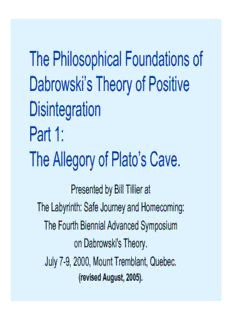
The Allegory of Plato's Cave. PDF
Preview The Allegory of Plato's Cave.
The Philosophical Foundations of Dabrowski’s Theory of Positive Disintegration Part 1: The Allegory of Plato’s Cave. Presented by Bill Tillier at The Labyrinth: Safe Journey and Homecoming: The Fourth Biennial Advanced Symposium on Dabrowski's Theory. July 7-9, 2000, Mount Tremblant, Quebec. (revised August, 2005). Overview of essentialism - 1: 2 • Plato represents essentialism: • An approach to philosophy that emphasizes essence. • There are universal essences, for example, that represent absolute truths, these are true everywhere and in every time. • There are individual essences “within us” that determine who we will be as individuals. • Each of us must uncover or discover these essences. • These essences are both our potentials and our limitations. Overview of essentialism - 2: 3 • Plato said the absolute and eternal Forms represent essences. Forms are literally beyond our day-to-day world. • This is a metaphysical approach. • Summary: Things, and people, have essences, for Plato, represented by their metaphysical Forms. • [In contrast, Aristotle said essence is contained within everyday matter. For example, the basic essence of a frog resides within the cells of a tadpole and while its Form may change (it becomes a frog), its "frog essence" remains unchanged. Things, and people, have enduring essences, for Aristotle, contained within their matter.] • Dabrowski: echoes Aristotle, a person’s essence is in their genes. Contrasted with existentialism: 4 • Existentialism emphasizes existence rather than essence: • Existence precedes essence. • Existentialism emerges from: Dostoyevsky, Kierkegaard, Nietzsche, Heidegger and Sartre among others. • There is no timeless or absolute truth or reality and therefore life is largely meaningless. Whatever truth or meaning we experience, we create as we participate in the experience of life. • Each of us must create our own truth out of our own experience. The self is not predetermined, over time, we build our autonomous self from our actions. • Sartre: We each have a responsibility and freedom to choose our actions; to do so is authenticity: "Man is nothing else but that which he makes of himself." Dabrowski and philosophy: 5 • Dabrowski was influenced by essentialism & existentialism: • The individual has certain individual essences and as well, has a degree of individual freedom he or she must exercise to become an authentic individual. • Ultimately, Dabrowski felt that essence was the more important of the two aspects: • "Essence is more important than existence for the birth of a truly human being." • "There is no true human existence without genuine essence." (both quotes from: Existential thoughts and Aphorisms, page 11). • Plato’s approach was a key element in Dabrowski’s theory. This presentation will review Plato’s philosophy. Basic ideas of Socrates - 1: 6 • Socrates had a tremendous influence on his student, Plato. • Socrates believed that everyone holds moral truth and knowledge within; however, most people are unaware of it. • Reasoning, not perception, will reveal this deep & timeless Knowledge. • Knowledge is of critical importance: we must KNOW before we ACT. • By asking someone questions in a dialogue, the person answering can be drawn to discover this truth for him or herself. Basic ideas of Socrates - 2: 7 • Complacent acceptance of traditional or external views is the status quo but is unsatisfactory. • We must be conscious of something and be able to explain it for it to have any meaning; “the unexamined life is not worth living.” • People seek to be happy and thus naturally seek virtue, people are not inherently evil, only ignorant of the Good. • What are absolute beauty and justice, apart from beautiful objects and good deeds? What are beauty and justice in all places and at all times? • Theory is a critical necessity; we must aspire toward ideals of theory. Plato - 1: 8 • Plato: "Mankind will not get rid of its evils until either the class of those who philosophize in truth and rectitude reach political power or those most powerful in cities, under some divine dispensation, really get to philosophizing.” • Plato was born to an aristocratic family in Athens and lived from 428 - 354BC. • Always interested in politics, Plato became a student of Socrates. • Information from this period is often questionable. Plato - 2: 9 • When Socrates was purged, Plato became disillusioned with politics and came to see that “mankind's fate was hopeless unless there was a deep change in men's education, and especially in the education of those intending to become statesmen” (http://phd.evansville.edu/life.htm). • Plato founded the Academy, a prototype of the Modern University. Based on mathematics and with a wide focus, the Academy lasted 900 years. • Academy’s first major student (for 20 years) was Aristotle: • Aristotle later rejected Plato’s basic view of reality. • Plato was concerned about social and individual justice: to get out of life what is deserved, not less, not more. Context of Plato’s Cave -1: 10 • Plato’s cave is described in a dialogue presented in chapter VII of his major work, The Republic. • The cave is the best known of Plato’s dialogues and is open to many different presentations and interpretations. • The cave is an allegory given to simplify Plato’s complex mathematical explanation of the levels of reality: • Plato’s cave appears after a complex and subtle discussion of “The Divided Line,” a geometric description of the levels of reality and their corresponding degrees of knowledge. • Although an accomplished mathematician, Plato’s geometric description of the divided line doesn't quite “work” mathematically: it is assumed he intentionally designed it this way - but why?
Description: